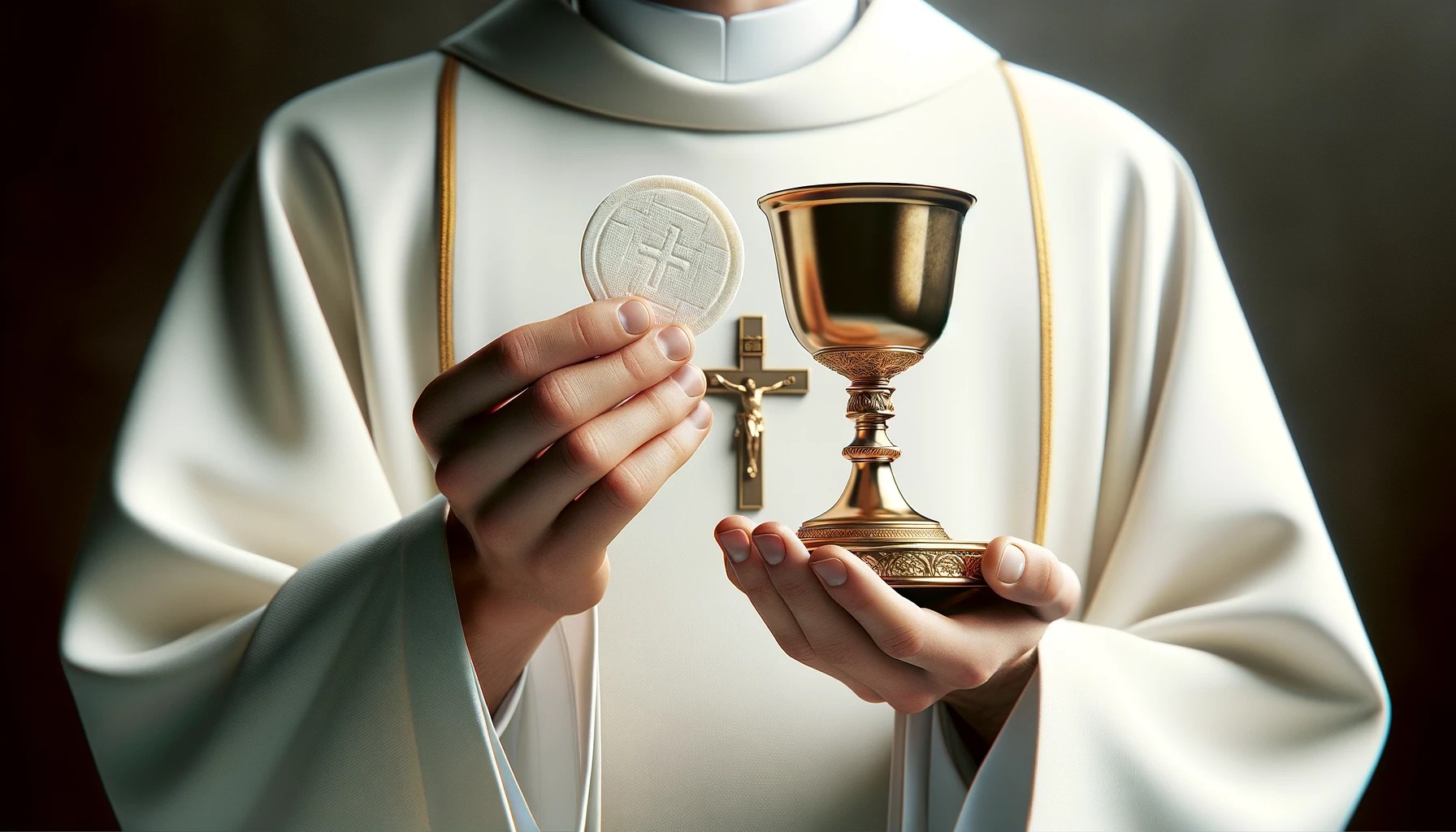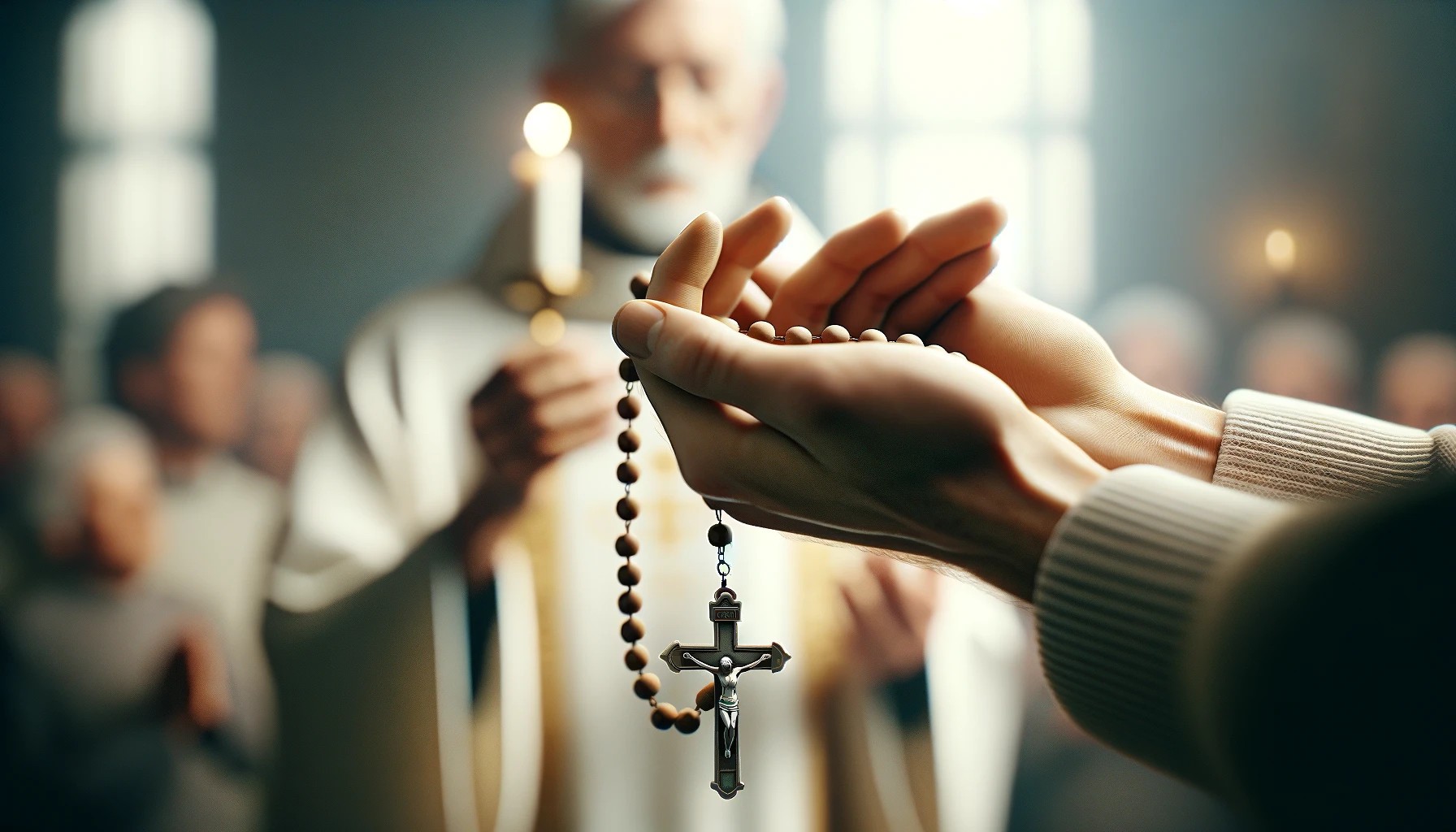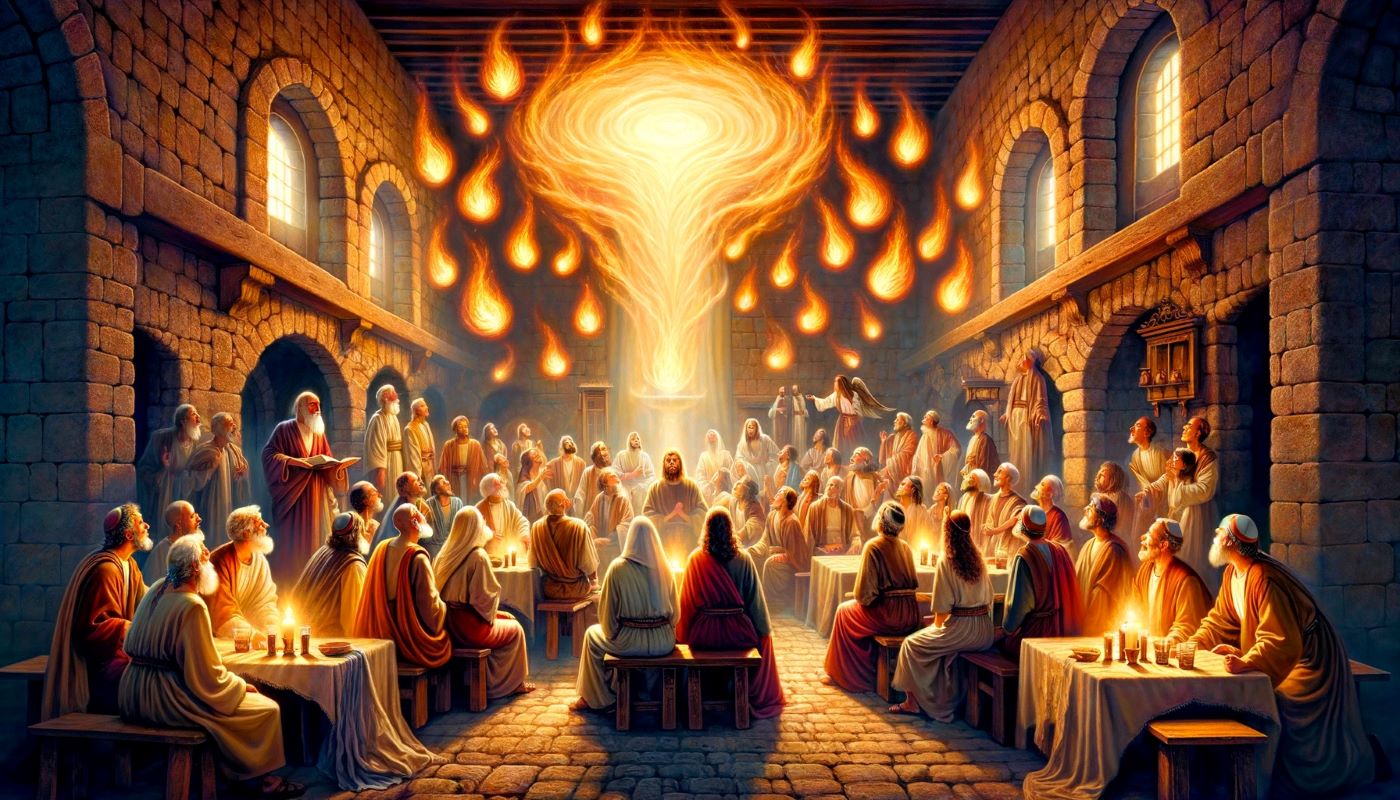Home>Theology and Spirituality>What Are The Benefits Of Receiving Holy Communion


Theology and Spirituality
What Are The Benefits Of Receiving Holy Communion
Published: February 25, 2024
Peter Smith, Editorial Director at Christian.net, combines deep insights into faith, politics, and culture to lead content creation that resonates widely. Awarded for his contributions to religious discourse, he previously headed a major organization for religious communicators, enhancing dialogue on faith's societal impacts.
Discover the spiritual benefits of receiving Holy Communion and deepen your understanding of theology and spirituality with this insightful guide. Explore the significance and transformative power of this sacred practice.
(Many of the links in this article redirect to a specific reviewed product. Your purchase of these products through affiliate links helps to generate commission for Christian.net, at no extra cost. Learn more)
Table of Contents
Introduction
Holy Communion, also known as the Eucharist, holds profound significance in various Christian traditions. It is a sacred sacrament that symbolizes the body and blood of Jesus Christ, and its observance is deeply rooted in the teachings of the New Testament. The act of receiving Holy Communion is a central aspect of Christian worship, representing a spiritual union with Christ and the community of believers.
The ritual of Holy Communion has been practiced for centuries, carrying with it a rich tapestry of theological, spiritual, and communal significance. It is a solemn and reverent observance that serves as a focal point of Christian worship services, fostering a sense of unity and spiritual nourishment among the faithful.
As we delve into the benefits of receiving Holy Communion, it is essential to approach this topic with reverence and an open heart. The act of partaking in the Eucharist is a deeply personal and communal experience, and its impact extends beyond the physical act of consuming bread and wine. Through this sacred ritual, believers are invited to enter into a profound encounter with the divine, experiencing spiritual nourishment, forgiveness, and a deepening of their faith.
In the following sections, we will explore the multifaceted benefits of receiving Holy Communion, delving into its spiritual, communal, and transformative dimensions. By understanding the profound significance of this sacrament, we can gain insight into the ways in which it enriches the lives of believers and fosters a deeper connection with the divine and the community of faith.
Understanding Holy Communion
Holy Communion, also referred to as the Eucharist, holds a central place in Christian worship and theology. It is a sacred sacrament that commemorates the Last Supper, a pivotal event in the life of Jesus Christ. During this final meal with his disciples, Jesus instituted the practice of sharing bread and wine as symbols of his body and blood, signifying the new covenant between God and humanity.
At its core, Holy Communion represents a profound spiritual mystery, embodying the presence of Christ within the elements of bread and wine. This act of partaking in the Eucharist is imbued with deep theological significance, as it symbolizes the believer's participation in the life, death, and resurrection of Jesus Christ. Through the consumption of the consecrated bread and wine, Christians symbolically unite themselves with the sacrificial love of Christ, embracing the spiritual nourishment and grace that emanate from this sacred act.
The ritual of Holy Communion is characterized by solemnity and reverence, underscoring its status as a sacred sacrament within Christian worship. It serves as a tangible expression of the believer's faith and devotion, providing a means of encountering the divine in a deeply personal and communal manner. As Christians partake in the Eucharist, they are invited to reflect on the sacrificial love of Christ and the transformative power of his redemptive work, fostering a sense of spiritual communion with the living presence of the Savior.
Furthermore, Holy Communion is not merely a symbolic reenactment of the Last Supper; rather, it is a profound encounter with the living Christ. In the act of partaking in the Eucharist, believers are invited to enter into a sacred space where the boundaries between the earthly and the divine are transcended. It is within this sacred encounter that the transformative power of the Eucharist is realized, as individuals are drawn into a deeper communion with the divine presence of Christ and the community of faith.
In essence, understanding Holy Communion entails embracing its multifaceted significance as a sacred sacrament that embodies the spiritual presence of Christ, fosters a sense of communal unity, and offers believers a tangible means of encountering the transformative grace of the Savior. It is a sacred ritual that transcends time and space, inviting believers to partake in the eternal mystery of Christ's redemptive love and the unifying bond of the Christian community.
Benefits of Receiving Holy Communion
Receiving Holy Communion offers a myriad of profound benefits that resonate deeply within the hearts and souls of believers. This sacred sacrament serves as a source of spiritual nourishment, a means of fostering unity with Christ and the community of faith, a channel for the forgiveness of sins, and a catalyst for the strengthening of faith. As believers partake in the Eucharist, they are invited to enter into a transformative encounter with the living presence of Christ, experiencing the profound grace and love that emanate from this sacred act.
Spiritual Nourishment
At the heart of Holy Communion lies the concept of spiritual nourishment. When believers partake in the Eucharist, they symbolically consume the body and blood of Christ, embracing the transformative grace and sustenance that flow from this sacred act. The act of receiving Holy Communion serves as a spiritual banquet, offering believers a tangible means of encountering the living presence of Christ and partaking in the abundant grace and love that emanate from the Savior. Through this sacred ritual, believers are nourished and sustained on a spiritual level, finding solace, strength, and renewal in the transformative power of the Eucharist.
Unity with Christ and the Church
Receiving Holy Communion fosters a profound sense of unity with Christ and the community of faith. As believers partake in the Eucharist, they symbolically unite themselves with the sacrificial love of Christ, embracing the redemptive work of the Savior and entering into a deep communion with his living presence. Furthermore, the act of receiving Holy Communion serves as a unifying bond within the Christian community, forging a sense of spiritual solidarity and shared devotion among believers. Through this sacred ritual, individuals are drawn into a deeper communion with Christ and the community of faith, experiencing a profound sense of belonging and unity within the body of Christ.
Read more: Why Do We Receive The Holy Communion
Forgiveness of Sins
Holy Communion serves as a channel for the forgiveness of sins, offering believers a means of reconciliation and spiritual renewal. As believers partake in the Eucharist, they are invited to reflect on the sacrificial love of Christ and the redemptive power of his atoning sacrifice. Through this sacred act, believers are offered the opportunity to seek forgiveness for their shortcomings and to experience the transformative grace of God's mercy. The act of receiving Holy Communion thus becomes a sacred moment of spiritual renewal and reconciliation, allowing believers to experience the liberating power of God's forgiveness and grace.
Strengthening of Faith
Receiving Holy Communion serves as a catalyst for the strengthening of faith. As believers partake in the Eucharist, they are invited to reaffirm their commitment to Christ and to embrace the transformative power of his redemptive love. Through this sacred ritual, believers are offered a tangible means of deepening their faith and experiencing a renewed sense of spiritual devotion. The act of receiving Holy Communion becomes a sacred expression of faith, allowing believers to draw closer to the living presence of Christ and to find strength, inspiration, and renewal in the transformative grace of the Eucharist.
In essence, the benefits of receiving Holy Communion are multifaceted and profound, encompassing spiritual nourishment, unity with Christ and the community of faith, the forgiveness of sins, and the strengthening of faith. Through this sacred sacrament, believers are invited to enter into a transformative encounter with the living presence of Christ, experiencing the profound grace and love that emanate from the Eucharist.
Spiritual Nourishment
At the heart of Holy Communion lies the concept of spiritual nourishment. When believers partake in the Eucharist, they symbolically consume the body and blood of Christ, embracing the transformative grace and sustenance that flow from this sacred act. The act of receiving Holy Communion serves as a spiritual banquet, offering believers a tangible means of encountering the living presence of Christ and partaking in the abundant grace and love that emanate from the Savior.
The notion of spiritual nourishment within the context of Holy Communion encompasses a profound sense of sustenance for the soul. Just as physical nourishment is essential for the well-being of the body, spiritual nourishment is vital for the flourishing of the innermost being. Through the act of partaking in the Eucharist, believers are invited to partake in a sacred feast, where the bread and wine serve as symbols of the spiritual sustenance and grace that flow from the living presence of Christ.
The concept of spiritual nourishment through Holy Communion extends beyond a mere symbolic gesture; it embodies a transformative encounter with the divine. As believers consume the consecrated elements, they are invited to enter into a sacred communion with the living presence of Christ, experiencing a profound sense of spiritual nourishment and renewal. The transformative grace that emanates from the Eucharist serves to nourish the soul, offering believers solace, strength, and sustenance on a spiritual level.
Moreover, the act of receiving Holy Communion becomes a deeply personal and communal experience of encountering the living Christ. It is within this sacred encounter that believers find themselves nourished and sustained by the transformative grace and love that flow from the Savior. The spiritual nourishment derived from the Eucharist transcends the physical act of consuming bread and wine; it encompasses a profound encounter with the living presence of Christ, offering believers a source of solace, strength, and renewal for the journey of faith.
In essence, the concept of spiritual nourishment within the context of Holy Communion speaks to the profound grace and sustenance that believers receive through their encounter with the living presence of Christ. It is a sacred banquet where the soul finds nourishment, strength, and renewal, drawing from the abundant grace and love that emanate from the Savior. Through the act of receiving Holy Communion, believers partake in a transformative encounter with the divine, finding spiritual nourishment that sustains and enriches their journey of faith.
Unity with Christ and the Church
Receiving Holy Communion fosters a profound sense of unity with Christ and the community of faith. As believers partake in the Eucharist, they symbolically unite themselves with the sacrificial love of Christ, embracing the redemptive work of the Savior and entering into a deep communion with his living presence. Furthermore, the act of receiving Holy Communion serves as a unifying bond within the Christian community, forging a sense of spiritual solidarity and shared devotion among believers.
The concept of unity with Christ and the Church within the context of Holy Communion embodies a profound sense of spiritual communion and solidarity. Through the act of partaking in the Eucharist, believers are invited to enter into a sacred communion with the living presence of Christ, experiencing a deep sense of unity and spiritual connection with the Savior. This unity transcends individual experiences and becomes a communal expression of shared devotion and faith within the body of Christ.
Moreover, Holy Communion serves as a tangible expression of the believer's unity with the community of faith. As individuals partake in the Eucharist alongside their fellow believers, they are reminded of their shared identity as members of the body of Christ. This communal act of worship fosters a sense of spiritual solidarity and shared devotion, uniting believers in their common faith and commitment to Christ.
The act of receiving Holy Communion becomes a sacred moment of communal unity, where believers are drawn into a deeper communion with Christ and the community of faith. It serves as a tangible expression of the shared bond that unites believers as members of the body of Christ, fostering a sense of spiritual solidarity and shared devotion within the Christian community.
In essence, the concept of unity with Christ and the Church within the context of Holy Communion speaks to the profound sense of spiritual communion and solidarity that believers experience through their encounter with the living presence of Christ. It is a sacred expression of shared devotion and faith, uniting believers in their common identity as members of the body of Christ. Through the act of receiving Holy Communion, believers partake in a transformative encounter with the divine, experiencing a deep sense of unity and spiritual connection with the Savior and the community of faith.
Forgiveness of Sins
The concept of forgiveness of sins within the context of Holy Communion embodies a profound opportunity for believers to seek reconciliation and spiritual renewal. As individuals partake in the Eucharist, they are invited to reflect on the sacrificial love of Christ and the redemptive power of his atoning sacrifice. Through this sacred act, believers are offered the opportunity to seek forgiveness for their shortcomings and to experience the transformative grace of God's mercy.
The act of receiving Holy Communion becomes a sacred moment of spiritual renewal and reconciliation, allowing believers to experience the liberating power of God's forgiveness and grace. It serves as a tangible expression of the believer's desire for spiritual cleansing and restoration, as they approach the communion table with contrite hearts and a longing for reconciliation with God.
In the act of partaking in the Eucharist, believers are reminded of the profound significance of Christ's sacrificial love and the redemptive power of his atoning work. The bread and wine, symbolizing the body and blood of Christ, serve as a poignant reminder of the forgiveness and reconciliation that flow from the Savior's selfless act of love on the cross. As believers consume the consecrated elements, they are invited to embrace the transformative grace of God's forgiveness, finding solace and renewal in the assurance of divine mercy.
Furthermore, Holy Communion serves as a sacred moment of introspection and spiritual reckoning, as believers examine their hearts and seek reconciliation with God and one another. The act of partaking in the Eucharist becomes a profound expression of humility and repentance, as individuals acknowledge their need for God's forgiveness and grace. Through this sacred ritual, believers are offered the opportunity to lay their burdens at the feet of the Savior, seeking spiritual cleansing and renewal in the transformative grace of the Eucharist.
In essence, the concept of forgiveness of sins within the context of Holy Communion speaks to the profound opportunity for believers to seek reconciliation and spiritual renewal through their encounter with the living presence of Christ. It is a sacred moment of introspection and humility, where believers are invited to seek God's forgiveness and grace, finding solace and renewal in the transformative power of the Eucharist. Through the act of receiving Holy Communion, believers partake in a transformative encounter with the divine, experiencing the liberating power of God's forgiveness and the assurance of divine mercy.
Strengthening of Faith
The act of receiving Holy Communion serves as a catalyst for the strengthening of faith. As believers partake in the Eucharist, they are invited to reaffirm their commitment to Christ and to embrace the transformative power of his redemptive love. Through this sacred ritual, believers are offered a tangible means of deepening their faith and experiencing a renewed sense of spiritual devotion.
At its core, the strengthening of faith through Holy Communion encompasses a profound opportunity for believers to reaffirm their spiritual commitment and to draw closer to the living presence of Christ. The act of partaking in the Eucharist becomes a sacred expression of faith, as individuals approach the communion table with reverence and a longing for a deeper communion with the Savior. It is within this sacred encounter that believers find strength, inspiration, and renewal in the transformative grace of the Eucharist.
Moreover, Holy Communion serves as a tangible expression of the believer's desire to deepen their faith and to draw closer to the living presence of Christ. As individuals consume the consecrated elements, they are invited to enter into a sacred communion with the transformative love of the Savior, finding solace and renewal in the assurance of divine grace. The act of receiving Holy Communion becomes a profound expression of spiritual devotion, allowing believers to reaffirm their commitment to Christ and to draw strength from the transformative power of the Eucharist.
Furthermore, the act of receiving Holy Communion becomes a sacred moment of spiritual renewal and inspiration, as believers draw from the abundant grace and love that flow from the living presence of Christ. It serves as a tangible expression of the believer's longing for a deeper communion with the Savior, offering a source of strength, inspiration, and renewal for the journey of faith. Through the act of receiving Holy Communion, believers partake in a transformative encounter with the divine, experiencing a renewed sense of spiritual devotion and a deepening of their faith in the redemptive love of Christ.
In essence, the strengthening of faith within the context of Holy Communion speaks to the profound opportunity for believers to reaffirm their commitment to Christ and to draw closer to the transformative love of the Savior. It is a sacred expression of spiritual devotion, offering believers a source of strength, inspiration, and renewal as they deepen their faith in the redemptive power of the Eucharist. Through the act of receiving Holy Communion, believers partake in a transformative encounter with the divine, experiencing a renewed sense of spiritual devotion and a deepening of their faith in the redemptive love of Christ.
Communion with the Body of Christ
Communion with the Body of Christ holds profound significance within the context of Holy Communion. As believers partake in the Eucharist, they enter into a sacred communion with the mystical body of Christ, which encompasses the collective community of believers united in faith and devotion. This concept embodies a profound sense of spiritual interconnectedness and solidarity, reflecting the deep bond that unites believers as members of the body of Christ.
At its core, communion with the Body of Christ speaks to the interconnectedness of the Christian community, transcending individual experiences and fostering a sense of shared devotion and faith. Through the act of receiving Holy Communion, believers symbolically unite themselves with the collective body of Christ, embracing the shared identity as members of the faith community. This communal act of worship becomes a tangible expression of the shared bond that unites believers, fostering a sense of spiritual solidarity and interconnectedness within the body of Christ.
Furthermore, communion with the Body of Christ extends beyond the physical act of partaking in the Eucharist; it embodies a deep spiritual communion with the living presence of Christ and the community of faith. As believers consume the consecrated elements, they are invited to enter into a sacred communion with the transformative love of the Savior, experiencing a profound sense of unity and spiritual connection with the mystical body of Christ. This communion transcends individual experiences and becomes a communal expression of shared devotion and faith within the body of Christ.
Moreover, communion with the Body of Christ serves as a poignant reminder of the interconnectedness and interdependence of the Christian community. As believers partake in the Eucharist alongside their fellow worshippers, they are reminded of their shared identity as members of the body of Christ, fostering a sense of spiritual solidarity and shared devotion. This sacred act of communion becomes a tangible expression of the unity and interconnectedness that define the Christian community, offering believers a source of spiritual nourishment and strength as they journey together in faith.
In essence, communion with the Body of Christ embodies the profound interconnectedness and spiritual solidarity that believers experience through their encounter with the living presence of Christ and the community of faith. It is a sacred expression of shared devotion and faith, uniting believers in their common identity as members of the body of Christ. Through the act of receiving Holy Communion, believers partake in a transformative encounter with the divine, experiencing a deep sense of unity and spiritual connection with the Savior and the community of faith.
Conclusion
In conclusion, the act of receiving Holy Communion holds profound significance within the Christian faith, offering believers a transformative encounter with the living presence of Christ and the community of faith. The benefits of partaking in the Eucharist are multifaceted, encompassing spiritual nourishment, unity with Christ and the Church, the forgiveness of sins, and the strengthening of faith. Through this sacred sacrament, believers are invited to enter into a profound encounter with the divine, experiencing the abundant grace and love that emanate from the Savior.
Holy Communion serves as a source of spiritual nourishment, providing believers with a tangible means of encountering the living presence of Christ and partaking in the transformative grace and sustenance that flow from the Eucharist. It becomes a sacred banquet where the soul finds nourishment, strength, and renewal, drawing from the abundant grace and love that emanate from the Savior.
Furthermore, receiving Holy Communion fosters a profound sense of unity with Christ and the community of faith, serving as a unifying bond within the Christian community. Believers are invited to enter into a deep communion with the living presence of Christ, experiencing a profound sense of belonging and unity within the body of Christ.
The act of partaking in the Eucharist also serves as a channel for the forgiveness of sins, offering believers a means of reconciliation and spiritual renewal. It becomes a sacred moment of spiritual renewal and reconciliation, allowing believers to experience the liberating power of God's forgiveness and grace.
Moreover, Holy Communion serves as a catalyst for the strengthening of faith, offering believers a tangible means of deepening their spiritual devotion and reaffirming their commitment to Christ. It becomes a sacred expression of faith, allowing believers to draw strength, inspiration, and renewal in the transformative grace of the Eucharist.
Additionally, communion with the Body of Christ embodies the profound interconnectedness and spiritual solidarity that believers experience through their encounter with the living presence of Christ and the community of faith. It becomes a sacred expression of shared devotion and faith, uniting believers in their common identity as members of the body of Christ.
In essence, the act of receiving Holy Communion is a sacred and transformative experience that enriches the spiritual lives of believers, fostering a deep sense of communion with the living presence of Christ and the community of faith. It serves as a tangible expression of the abundant grace and love that flow from the Savior, offering believers spiritual nourishment, unity, reconciliation, and a deepening of faith. Through the act of receiving Holy Communion, believers partake in a transformative encounter with the divine, experiencing the profound grace and love that emanate from the Eucharist.













